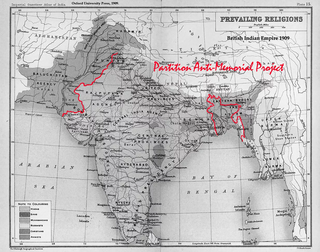
Sharif Hussain, who used the pseudonym Nasīm Hijāzī, was an Urdu novelist.

The Partition of India and the associated bloody riots inspired many creative minds in the republics of India, Pakistan, and Bangladesh to create literary/cinematic depictions of this event. While some creations depicted the massacres during the refugee migration, others concentrated on the aftermath of the partition in terms of difficulties faced by the refugees in both side of the border. Even now, more than 60 years after the partition, works of fiction and films are made that relate to the events of partition. W.H. Auden in his poem "Partition" showed the dilemmas of Cyril John Radcliffe, 1st Viscount Radcliffe, responsible for deciding which parts of India went where.
Ali Sardar Jafri was an Indian writer of Urdu language. He was also a poet, critic and film lyricist.
Shaheen is a 1948 historical novel written in Urdu by Pakistani Islamic historian and novelist Naseem Hijazi.

The Urdu movement was a socio-political movement aimed at making Urdu, as the universal lingua-franca and symbol of the cultural and political identity of the Muslim communities of the Indian subcontinent during the British Raj. The movement began with the fall of the Mughal Empire in the mid-19th century, fuelled by the Aligarh movement of Sir Syed Ahmed Khan. It strongly influenced the All India Muslim League and the Pakistan movement.

Panun Kashmir is a proposed union territory of India in the Kashmir Valley, which is intended to be a homeland for Kashmiri Hindus. The demand arose after the Exodus of Kashmiri Hindus in 1990. The vision of the homeland was elucidated in the Margdarshan Resolution of 1991. Panun Kashmir is also the name of an eponymously named organization.
Jazib Qureshi is an Urdu poet, writer and critic from Pakistan. He has written many poetry books and works of literary critique.

Dastaan is a Pakistani television series based on the 1971 novel Bano by Razia Butt. Dramatized by author and screenwriter Samira Fazal, it originally aired on Hum TV in 2010. It is set amidst the partition of India and the establishment of Pakistan, taking place between 1947 and 1956. It depicts the story of Bano, a Muslim girl from a close-knit family living in Ludhiana, Punjab Province; the plot revolves around the trials and tribulations that she faces after she decides to dedicate her life to the All-India Muslim League.
Saleem Safi is a Pakistani journalist and talk show host for the show Jirga. He specializes in foreign policy, terrorism, Kashmir conflict, Afghan conflict and the politics of Pakistan.
Abdul Aziz Kashmiri was an Indian Kashmiri journalist.

Bano is an Urdu language novel by the Pakistani novelist, Razia Butt, which is considered one of her best literary works. It is set in the days before and after the Partition of India in Ludhiana, Punjab Province and subsequently, Pakistan. The events of Partition play a central role in the story. It is named for its female, protagonist, Bano.
Yousaf Saleem Chishti, popularly known as Yusuf Salim Chishti, was a Pakistani scholar and writer. He was the interpreter and commentator of Muhammad Iqbal's work and worked with him from 1925 to 1938 predominantly.

Sheikh Ghulam Rasool Noori born 19 March 1954 in Gangoo Pulwama Kashmir is a well known Shia Muslim scholar, reformer, preacher and cleric from Kashmir. He is known for his religious sermons and lectures, especially during the Muslim month of Muharram. Noori delivers lectures in both the Kashmiri and Urdu languages, he is deemed as a bridge between Kashmiri and Urdu temperaments. Moreover, he is famous for his addressing of social issues through Islamic Philosophy. Noori is wakil of Ayatollah Ali Khamenei in Kashmir. Before becoming a religious scholar and theologian he was working as a lecturer. Noori is a stout supporter of the Islamic Revolution that was brought about by Imam Khomeini in Iran, he by his speeches conveyed it to the other parts of the world especially Kashmir. He propagates and preaches the doctrine of Wilayat-e-Fiqh.

Nasir Abbas Nayyar is a Pakistani Urdu language writer, critic, columnist, and essayist. He has written books on poetry, literary theory and post colonial study of Urdu literature. He has produced some important books on structuralism and postmodernism and their influence on Urdu literature. A book on life and poetics of Majid Amjid is another his significant contribution. His most famous work is on Postcolonial Study of Urdu Literature published by Oxford University Press, Karachi, Pakistan titled Mabad Nau Abadiat and Urdu Adab ki Tashkeel e Jadid. His books on post colonialism proved ground breaking works in Urdu.
Shafi Aqeel was a Pakistani journalist, writer, poet, art critic and translator.
"Mujh Se Pehli Si Mohabbat Mere Mehboob Na Maang" is an Urdu nazm by Faiz Ahmad Faiz. The song is popular through its rendition by singer Noor Jehan and has been notably performed by many others. According to Faiz, the nazm also marks his transition from romantic work of his earlier years to mature works of his later years.
Khaak Aur Khoon is a 1979 Pakistani Urdu film directed by Masood Parvez and based on Naseem Hijazi's novel of the same name. The lead cast included Naveen Tajik, Shujaat Hashmi, Abid Ali, and Mehboob Alam. Despite having an average box office performance, Khaak Aur Khoon received 8 Nigar Awards for various aspects of filmmaking.
Shaheen is a 1980 Pakistani historical and Islamic drama television series originally broadcast on PTV. The series was based on the novel of the same name by Naseem Hijazi and dramatised by Saleem Ahmad. Set in the 1490s in Granada, the series entails the glorious past of the Muslims and revolves around their downfall in Andalus.

Insaan Aur Devta is a 1944 Urdu novel by Naseem Hijazi. Set in some time in Ancient India, the novel depicts the strange relationship between human beings and their gods and the cruelties of the prevailing caste system.









